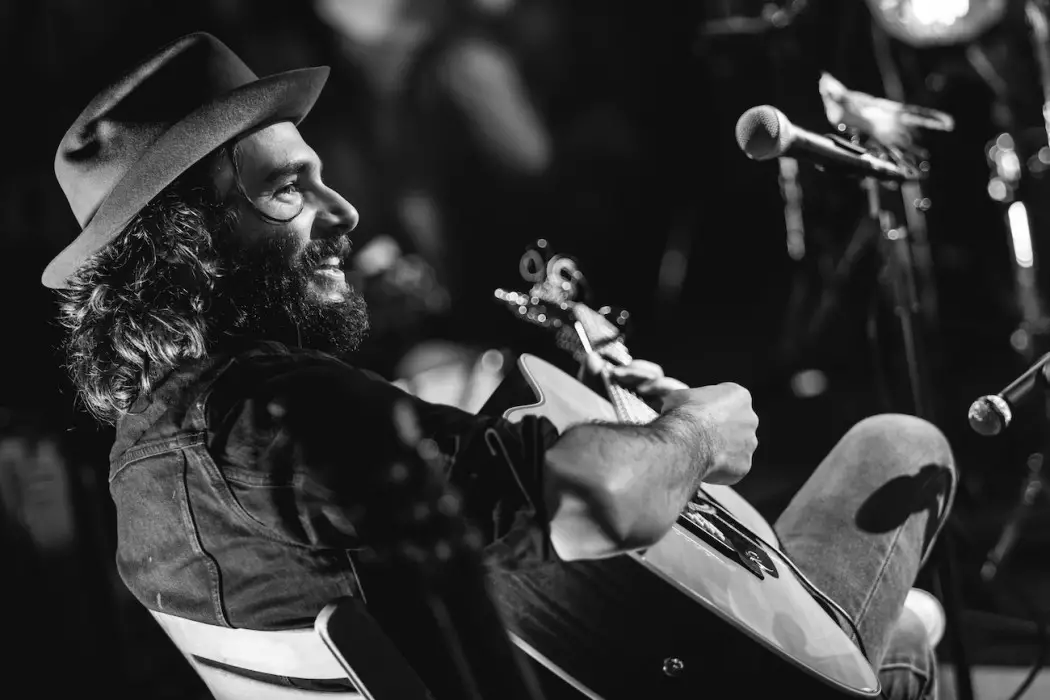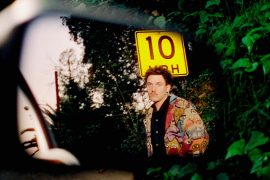Ahead of the release of his latest blue-collar-rock offering ‘No Rest for the Wicked’ EP, Adam Baldwin spoke to Atwood Magazine about sobriety, staying true to yourself, and that one influence that no one picks up on.
— —
Adam Baldwin closes his new EP by singing, “I’m here to tell you gently, there’s no peace to find,” — and yet, he sounds calm and content. Fresh from a tour supporting his best friend and longtime bandmate Matt Mays, a certain sense of excitement for a second chance at life is tangible over the phone as Baldwin speaks. And why shouldn’t there be? With No Rest For The Wicked (due out this Friday, March 29th) and his sobriety holding strong, it feels like things are finally coming up Baldwin.
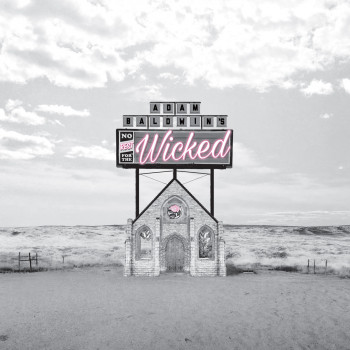
It wasn’t easy though. No Rest For The Wicked is a six-song exploration of rock-bottom; an Americana-style attempt at understanding where things went wrong. It’s the result of time spent away from the world with a mirror and a pen – at times both blasting and tender, but always personal.
Listening to No Rest For The Wicked feels like you’re getting to know Adam Baldwin, which is little surprise as it was largely him getting to know himself. From the scathing self-assessment of EP opener “Half a Mind,” through his reckoning of the damage he’s caused to his relationships in “Shattered,” to the haunting title track closer, No Rest For The Wicked is grounded and self-aware. Despite the obvious pain in every line, there’s a definite sense of hope throughout.
Ahead of the release of his latest blue-collar-rock offering, Adam Baldwin spoke to Atwood Magazine about sobriety, staying true to yourself, and that one influence that no one picks up on.
I can’t afford to go see a shrink, so the best way I know how to do it is to sober up for a while and take a good, long, hard look in the mirror…
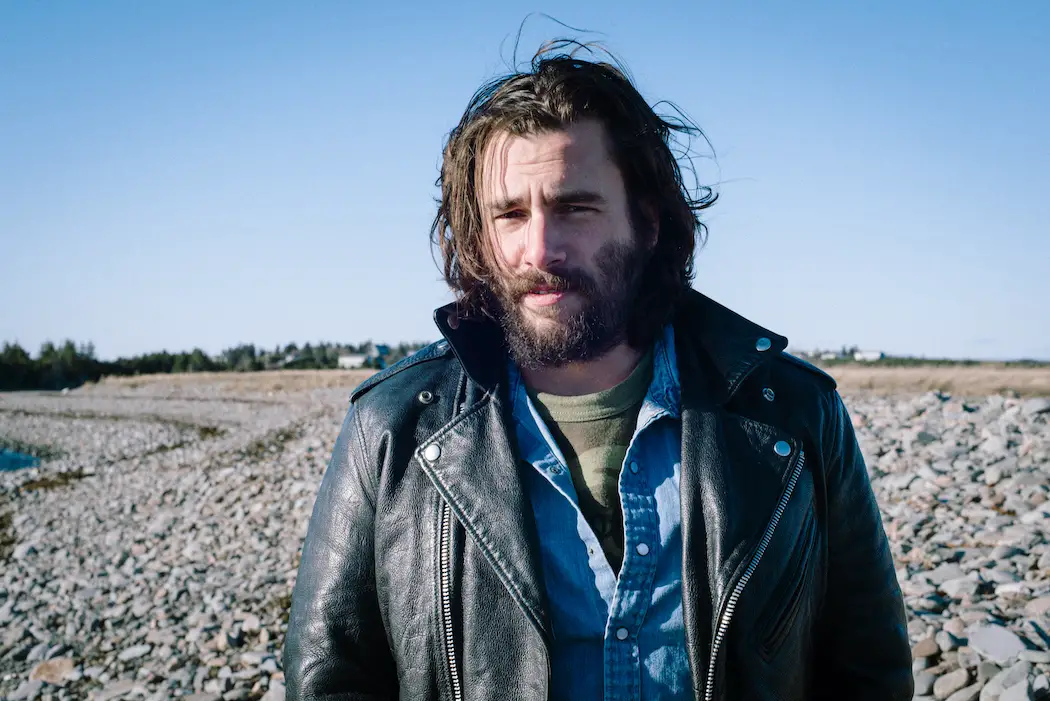
A CONVERSATION WITH ADAM BALDWIN
Atwood Magazine: Now the record is finished and you’re waiting for it to be released, how do you feel about it?
Adam Baldwin: I’m excited for folks to hear it. I’m very proud of it, it came out just the way I hoped it would.
What’s the backstory to this record?
Baldwin: I just sort of had a bit of a mental breakdown of sorts. I was partying too hard and everything I cared about was slowly but surely disappearing. In some sort of drug-induced paranoia I freaked out and called everybody I knew and loved and I told them I was a mess and that I needed help. I took some time off the road and after a few weeks sitting around and twiddling my thumbs, I put pen to paper and all of that came out.
It sounds like a very cathartic album; there’s certain moments where you can hear you’re working through something.
That’s the word I keep using. It was cathartic writing it, the few times I’ve have the opportunity to play the songs live it’s been super cathartic too. It’s a very biographical piece of music: I’m the leading expert on myself and it just felt good to get all of that out.
It’s a very biographical piece of music: I’m the leading expert on myself and it just felt good to get all of that out.
At one point you had twenty-plus songs, so why only a six song EP?
Baldwin: Anybody can write twenty songs, that doesn’t mean they’re all good [Laughs]. There was a story I wanted to tell, and so whatever told the narrative and what was the most succinct—and the best songs of the bunch—was what we wound up with.
Do you have a plan for the next chapter?
Baldwin: Well, that all depends on how things go for me. I write what I know; I’m not very good at making up stories. I’m working on songs right now that are little less heavy, a little less dark, but are still nonetheless stories that I know and that I’ve seen. I’d like to revisit a lot of the [cut] songs I wrote for No Rest For The Wicked, but just not quite yet.
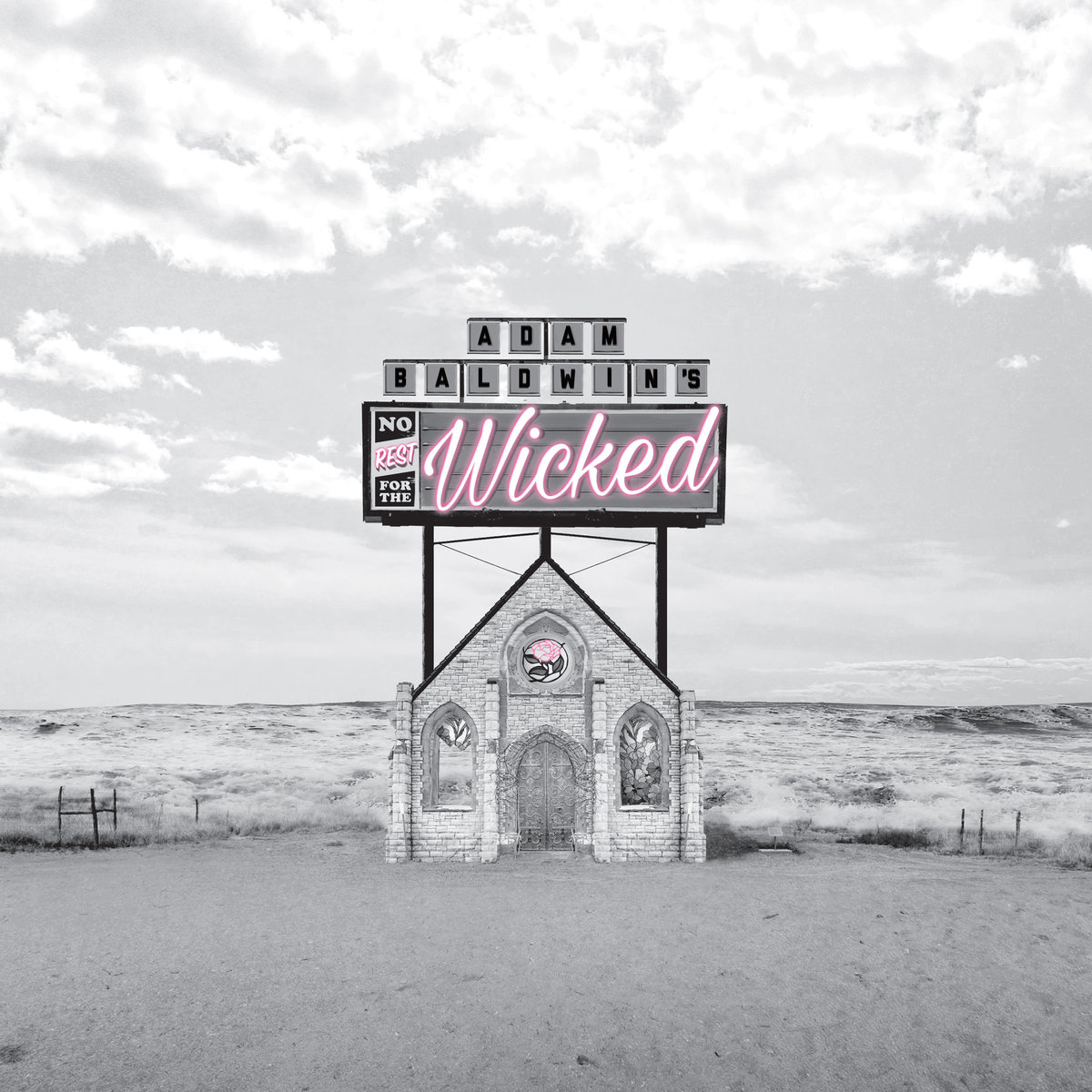
What does the phrase or the concept of “No Rest For The Wicked” mean to you?
Baldwin: It’s just sort of being perpetually hungover and strung out; when you live your life that way there’s no lapse in it, there’s no break in that. When you have that kind of junk yard dog barking at your heels all day long, unless you really take some serious steps to address some of the problems one may have, then that fucking black dog just keeps barking and there’s no escaping it until you actively try to escape it.
You can only ignore it for so long.
Baldwin: That’s exactly right.
Unlike previous records, this album is focused completely inward, placing your story front and centre; was this a conscious decision that this was the best way to tell your story?
Baldwin: Totally, absolutely. I needed to do it for my own health. I had to unpack a lot of things and this is the only way I know how to do it. I’m a self-employed guitar player. I can’t afford to go see a shrink, so the best way I know how to do it is to sober up for a while and take a good, long, hard look in the mirror and write down all the things I was seeing and all the things that I brought upon myself. It saved me a few bucks and made me feel alright.
That must have been a hard process to go through.
Baldwin: Yeah, it wasn’t easy and it wasn’t fun. But I really learnt a lot about myself doing it. As a result of having written all that I figured a lot of things out and I was then able to salvage a lot of the wreckage I’ve left in my wake over the years. Life is better for me for having done it that way.
What was the hardest song to write, record, or listen to now?
Baldwin: I can’t really say any of them was any harder than any other. It was all really difficult to come to terms with: I’m a drug addict. That was the hardest part. Once I had admitted it to myself, that’s when I was able to make sense of all of it and clear the way for the songs to come. I was being honest with myself—probably for the first time in my adult life—and so when I listen to them, it’s like looking in the mirror slash seeing your life flash before your eyes. It’s all me, for better or for worse, so it’s not hard to listen to anymore because I’ve come to understand it all.
It was all really difficult to come to terms with: I’m a drug addict. That was the hardest part.
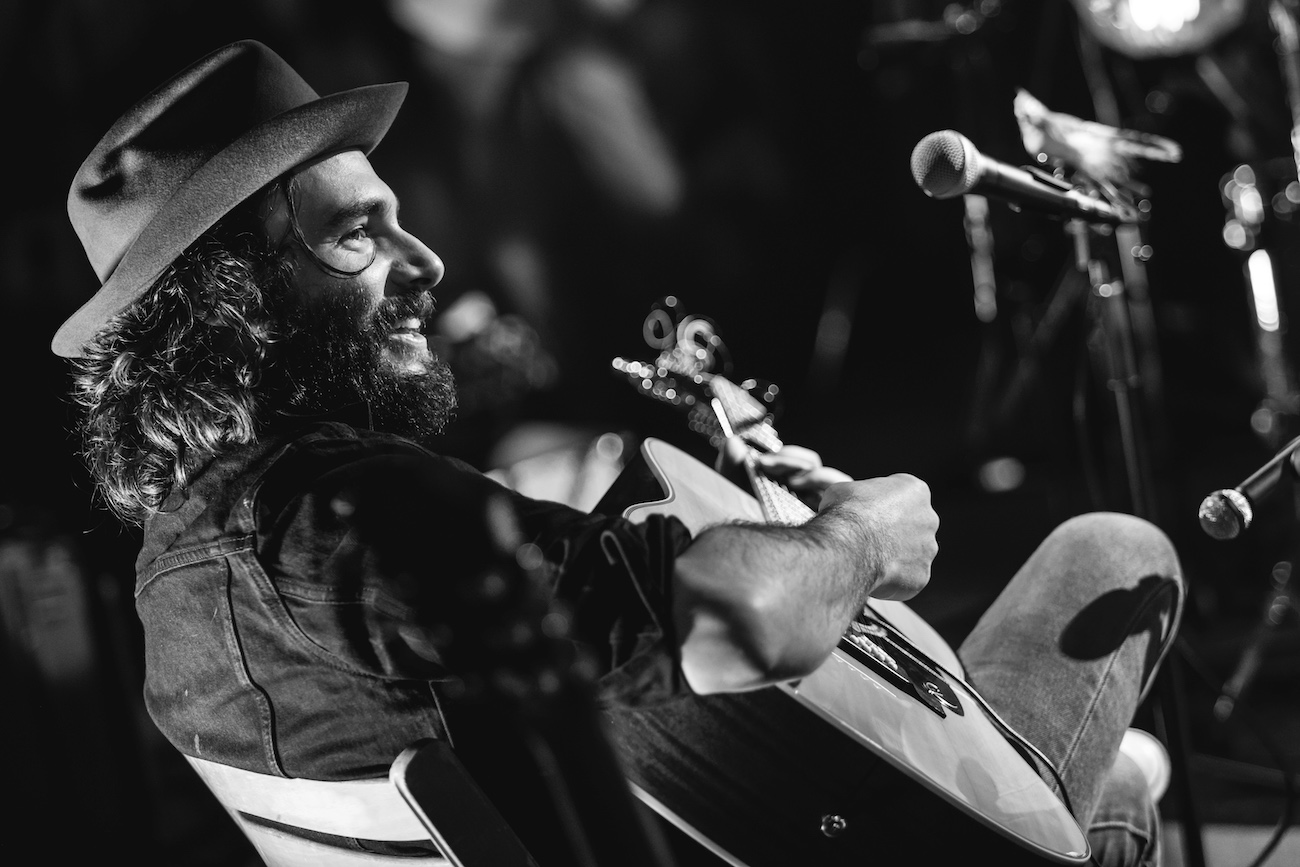
That’s a beautiful process, it must be almost nice to listen back and see the progress you’ve made?
Baldwin: Yeah, almost [laughs]. There’s a lot of sour memories that it can bring up. But I did those things and I have to live with them so everyday I try to make better all the things that I made worse.
You said last year that you were proud of your debut album No Telling When (Exactly Nineteen Eighty-Five) but you felt like you couldn’t support it properly, so your hope for this EP was to make people go back and listen to your debut: Do you think you achieved this?
Baldwin: With No Telling When I sort of bit off more than I could chew; I didn’t really budget enough time or money to finish it. I would have loved to put some more vocal stuff on it and spend a bit more time on some of the nuance, so the approach for this one was to do less, and do more with less. Gus van Go and his partner Werner produced it and we took our time with parts and sounds and we made sure it was finished to everybody’s satisfaction—and I’m really thrilled we did.
You can hear Springsteen, Petty, but who is one influence you’d surprise me with?
Baldwin: Mark Knopfler [of Dire Straits]. Same with on No Telling When. I try to borrow a lot of vocal phrasing from him, I like the way he delivers lyrics and even on “No Rest For The Wicked”, that guitar lick is the guitar lick from “Walk of Life” essentially. Exact opposite subject matter of that song but I steal a lot from Mark Knopfler and not many people catch it, which I’m kind of into.
Delirious for Serious is a lot poppier than the rest of the EP, was this a conscious decision?
Baldwin: When I wrote that and when I did the demo of it, it’s almost something you would hear at a dance club. It’s full of synthesizers and a disco beat. So we took it more into a Heartbreakers area when we recorded it for real, but I think the soul of that song is rooted deeply in shitty dance pop music.
I’ve always wondered about the synthesizers in your music, where does that come from?
Baldwin: I don’t know. I do a lot of recording on Garageband when I’m getting ideas down and I just like friggin around with the synthesizer sounds on that thing. You know, Tom Petty—and Bruce Springsteen for that matter—there’s a lot of their records that have those mellow pads underneath everything, that’s the stuff that I love and I rip it off from time-to-time, if not all of the time.
Compared to your previous work it’s a mellower album; there’s only a couple of times you really let rip. Was this planned or how it shaped up?
Baldwin: “Half a Mind” is a bit of a ripper, and “Salvation” as well. I don’t write records for any other reason than I got something I want to say, I have a bit of a story that I want to tell, and that’s what is paramount to me. I may very well make a record sometime of the slowest tempo jams you could ever want to hear if that’s what serves the song best and if that’s what serves the purpose of it. I don’t write songs for radio which is probably why I don’t have any goddamn money, and why folks aren’t coming out in droves to my shows, but I feel like there’s more important things than catering to a medium; I feel like you have to cater to the story and cater to the sentiment, otherwise I can’t see the point of doing it.
On “Salvation,” when you scream, “Open the fucking door,” who or what are you thinking about?
Baldwin: The character in that song is the drug addict, the Mr. Hyde to my Dr. Jerkyl, so the idea of the song is that that guy is forever taunting me, everyday when I wake up that guy is nipping at my heels. He’s like Darth Vader trying to get Luke Skywalker over to the dark side. So “Open the fucking door” is the addict in me at his wit’s end, he’s desperately trying to get this guy to go out and get fucked up. That’s where this came from and it’s a voice I’ve heard inside my head for twelve years, so I think that’s why I was able to deliver it so powerfully.
Stream: “Salvation” – Adam Baldwin
The idea of addiction as a personality, especially in “Salvation,” was this an artistic decision or how you see yourself?
Baldwin: It was something that came about as I was writing it. I really feel like there are two different entities that live inside me: There’s the one that knows better and there’s the one who doesn’t give a shit. In the interest of telling a story, I tried to map the whole thing out as though it were a movie. So that character, I gave him pretty distinct, dark qualities and wrote from that perspective as well as my own. They’re both my own, but you know what I mean.
Whenever I tell people about you, the first word I use is authentic.
Baldwin: That’s the nicest thing I could ever hope to hear man, that’s all I strive for. I hope that that comes through.
I think it does: When I hear you so clearly bleeding and working through stuff like you are on your records, as a listener it’s hard not to relate even if we’re experiencing different struggles.
Baldwin: Matt [Mays] and I talk about this a lot, and truthfully I would rather mean more to a small group of people—mean everything to a small group of people—than a little bit to a large group of people. I think there are still people who love music in its most authentic form and its most honest form. That’s something I believe in too, and it’s something that’s important to me and I’ll sing to those people.
I think there are still people who love music in its most authentic form and its most honest form. That’s something I believe in too, and it’s something that’s important to me and I’ll sing to those people.
There must be a real freedom to thinking that way.
Baldwin: There’s a freedom in it for sure, but it presents its own problems when you’re a thirty-three year old man with two kids and you don’t want to play the game. But I get by, and I’m happy and content doing what I’m doing, and I think that’s what propels me to keep writing and keep trying to make art, because I can still stand to do it.
You just finished a tour supporting Matt Mays, how was that?
Baldwin: Yeah we just wrapped up a tour at the end of February, home for a little while, but yeah I’ve been criss-crossing the country with him for a long, long time and it’s been a pleasure. It’s nice to have that when I’m not doing my own thing, which is a lot of the time [laughs].
Yeah, you two seem pretty close.
Baldwin: He’s my best friend man, he’s like my big brother. I learnt a lot from him about writing songs and putting on a show. Having spent the last ten, eleven years with him I feel like I kind of skipped the line a little bit. I learnt a lot more, a lot quicker than a lot of folks would have.
I saw you guys at the Scotiabank Centre in Halifax, Nova Scotia, last year and you guys can really put on a show.
Baldwin: Oh man that was a blast.
I’ll be honest, it looked like you were all having more fun than the audience.
Baldwin: I think that most nights we do, truthfully. You’d be hard pressed to have more fun than we do most nights; it’s 90 minutes a day that we’re doing exactly we want to be doing, exactly where we want to be doing it, with exactly who we want to be doing it with. The rest of it sucks: Driving around in a van full of dudes farting and eating shitty burgers and whatever else, but it’s worth it for the 90 minutes we get to do that.
That sounds like a dream in one way.
Baldwin: It is; it’s a dream and a nightmare at the same time.
There’s a lot of religious imagery on this record; you’re not a religious man yourself so what’s the idea behind that?
Baldwin: With the song “Salvation,” I was going to twelve-step meetings and I sort of wrote that song in the basement of a church in the South end of Halifax. I just think there’s a lot of search for some sort of spirituality that I was going through at the time; I was looking for anything that could help. I was trying to find some sort of a God that I could understand and have some sort of relationship with or believe in. I was grasping at anything that was going to get me out of this goddamn mess that I found myself in. Not necessarily church but the idea of some unseen and unproven thing that may be able to save one’s soul, that was kind of what I was going through.
That must have sounded appealing at the time.
Baldwin: It was very appealing. Those twelve step meetings, they tell you “all you gotta do is find God and you’re gonna be cured” so I would have believed in anything if I could have—I couldn’t quite get there.
So you wrote music instead.
Baldwin: Well that’s it and I think that’s where my spirituality lies—in the relationship I have with people at shows. I think that’s something I can’t explain, much like God. I don’t understand what makes one person like my music and come out to my shows and buy my records, but I feel it in a room. Whether there’s five people there or ten people there or 300 people there or a thousand people there, there is something otherworldly that I can’t explain. I don’t need to explain it, but it has saved my life a million times over and continues to to this day.
Sounds like a magical moment.
Baldwin: You got that right.
— —
Adam Baldwin’s No Rest For The Wicked is out Friday, March 29th via Sonic Records.
— — — —
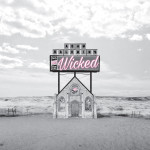
Connect to Adam Baldwin on
Facebook, Twitter, Instagram
Discover new music on Atwood Magazine
? © Lindsay Duncan

